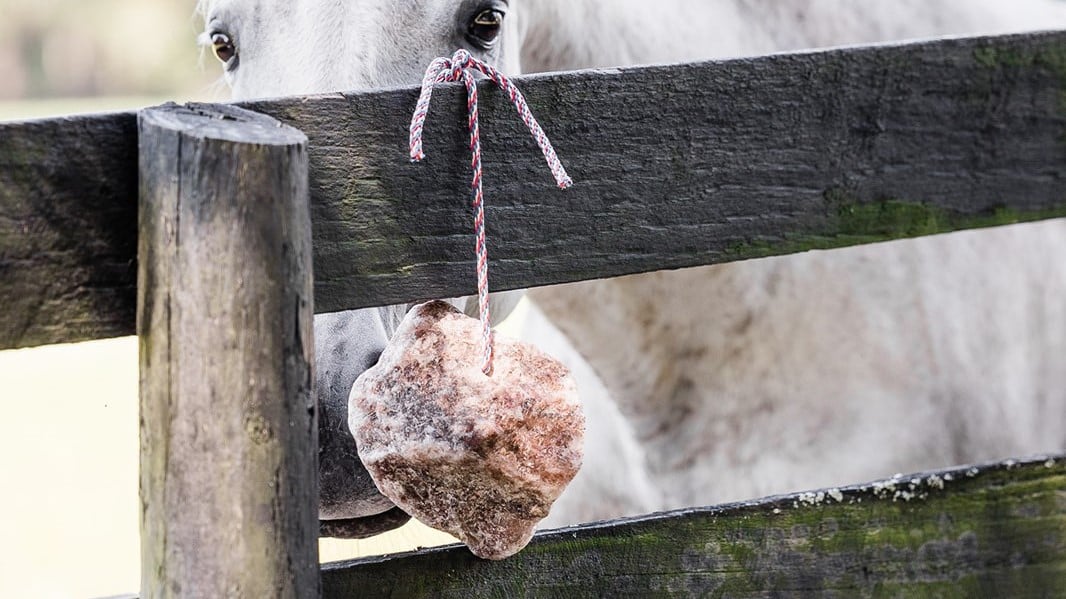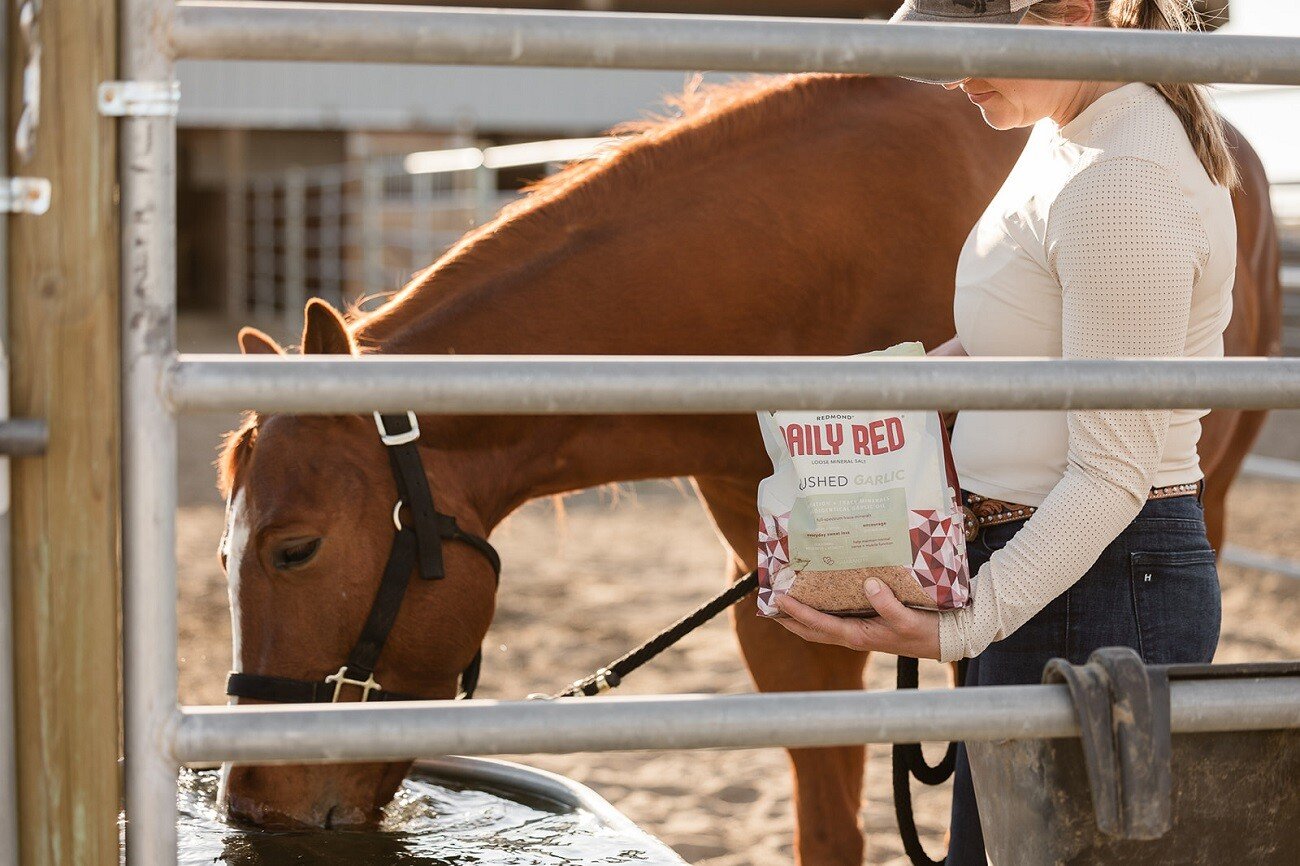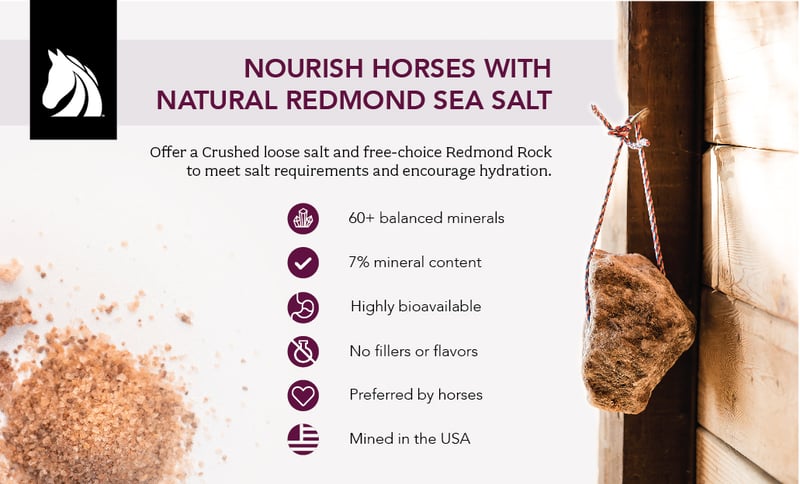4 Common Myths Regarding Salt Licks for Horses
June 13, 2023
4 Common Myths Regarding Salt Licks for Horses
Most horse owners know a hydrated horse is generally a healthy one, and a dehydrated horse is a potentially serious matter. We provide salt licks for horses to replace essential trace minerals and trigger their thirst for water. But what if horses ignore their blocks? How can you get them to drink more?
In this blog, we debunk four prevalent myths about salt and mineral licks for horses. Understanding these misconceptions will help you select a salt lick that suits your horse's needs, encourages regular use, and helps safeguard against dehydration and mineral deficiency.
Quick Content Guide
- Myth 1: Horses Will Lick Any Salt Block
- Myth 2: Mineral Blocks Are Cheaper and as Nutritious as Natural Rock Salt
- Myth 3: A Horse Salt Lick Provides All the Salt and Minerals They Need
- Myth 4: Dehydrated Horses Will Drink on Their Own
Myth 1: Horses Will Lick Any Salt Block
Horses like salt and will naturally seek out minerals in their environment. But most horses have a palate more finicky than a picky five-year-old human. Chances are, if your horse doesn’t like the taste of the salt or mineral block you put out, they won’t lick it. Here’s why.
Most blocks are heavily processed, and that can result in bitter flavor horses turn their noses up at. So, instead of your horse happily licking its mineral block, you may find it sitting unused and gathering bedding and manure in the corner—even when your equine needs the salt, electrolytes, or other minerals it offers.
To combat poor palatability, many manufacturers add molasses or other sweeteners to make bitter blocks taste better. Horses have a healthy sweet tooth and, as you may know, will often end up biting off chunks of sweetened block and eating it like candy. That is probably not the outcome you intended either. Let's explore a better option.
Tip: Choose a Natural Mineral Lick for Horses
The best salt lick for horses isn’t a conventional block at all. Consider instead a natural mineral rock like a Himalayan salt lick from Pakistan or Redmond Rock mined in Utah, USA. In taste tests, most horses prefer the natural subtly sweet flavor of mineral rocks, and they come in forms horses instinctively seek.
Mineral rocks have no fillers, preservatives, or added sugars, and the minerals are naturally balanced. By switching to a mined salt rock, you provide a supplement that appeals to your horse’s palate, increases the likelihood of regular licking, and delivers dozens of nature-made trace minerals.
Myth 2: Mineral Blocks Are Cheaper and as Nutritious as Natural Rock Salt
Part of this myth is true: often mineral blocks are cheaper pound for pound than mined mineral rocks. However, manufactured mineral blocks typically provide only a limited number of minerals your horse needs—usually seven or eight. Due to the limited number of trace minerals and because horses may not adequately lick a block due to palatability, you should not rely on one to meet your horse’s complete mineral needs.
A review on the bioavailability of trace minerals in production animals also found that inorganic, or manufactured, trace minerals (ITM) aren’t as bioavailable or readily absorbed in the digestive system as organic trace minerals (OTM).
The study notes, “OTM have been perceived as being more expensive based on direct comparisons of cost versus ITM. However, the return on investment in numerous studies has emphatically shown the advantages of incorporating organic forms of minerals.”
Tip: Natural Mineral Licks Contain More Bioavailable Trace Minerals
Redmond Rock and Himalayan salt licks are loaded with organic, bioavailable trace minerals that are easily absorbed in the body. Offering your horse a mined rock salt provides the diverse array of minerals it would find in its natural environment. Redmond Rock provides over 60 minerals, while Himalayan can have over 80.
The percentage of mineral content, however, is also important to consider. Redmond Rock boasts 7% mineral content in each rock, while Himalayan contains just 2%. With Redmond, horses receive a greater concentration of minerals that matter. A horse licking a Rock on a Rope.
Myth 3: A Salt Lick Provides All the Salt and Minerals Horses Need
In many situations, this is true—a quality, mined salt rock with a constellation of trace minerals will provide most horses with all the supplemental minerals they need, especially if they’re getting a quality hay/alfalfa mix and plenty of fresh water.
But some of us have very hard-working horses. They’re training and competing in vigorous events like cross-country, roping and reining, barrel racing, and endurance. These high-exertion disciplines demand a lot of energy and drain horses of vital minerals and electrolytes—especially if they’re working in the sun and sweating a lot.
Under these conditions, a horse may not get enough electrolytes and salt from licking a salt rock alone. Horses have smooth and sometimes sensitive tongues that can become sore after prolonged licking. Consequently, they may stop using a salt lick—even if they require additional minerals or are dehydrated.
Tip: Try Feeding a Loose Mineral Salt to Horses
To ensure optimal health and hydration for active horses, it is essential to consider additional methods of supplementing electrolytes and salt besides providing access to a salt rock.
Dr. Juliet Getty, an equine nutritionist, says the best way to feed salt to horses is to offer granulated salt free choice. If your horse ignores loose salt in a container, add it to his feed. A quality loose mineral salt, like Daily Red Crushed or Daily Red Fortified, replaces salt and critical electrolytes used during exertion or excessive sweating and provides a proper trigger to drink.
Dr. Getty also recommends providing horses with a free-choice salt rock in addition to loose minerals. A rock gives horses an on-demand source to help meet extra salt and mineral needs that fluctuate with weather or exercise.
Myth 4: Dehydrated Horses Will Drink on Their Own
Humans instinctively drink when they’re thirsty, so it’s natural to assume horses will do the same. However, this is not always true. Horses generally need a trigger to drink, and without adequate salt providing that trigger, many won’t consume enough water even when faced with hot temperatures, electrolyte depletion, or dehydration.
To understand horses’ finicky attitude toward drinking, we need to explore the intricate relationship between salt and fluid balance. A Kentucky Equine Research article about horse salt and electrolytes notes:
"Like all mammals, horses have a thirst response, a physiological trigger that tells them when to drink. This mechanism keeps horses from becoming dehydrated in everyday situations, and is dependent, at least in part, on electrolyte balance.
The thirst response is thought to hinge on sodium concentrations in the blood. In instances of light sweating, water is released, but the amount of electrolytes lost is minimal. The body recognizes this water loss and seeks to replace the deficit.
In instances of heavy or prolonged sweating, however, water and salt are both lost, and the sodium concentration of blood may not rise appreciably. So, horses will not drink even though they are dehydrated."
In other words, adequate salt consumption encourages horses to drink, while low sodium levels decrease thirst signals and quickly put horses at risk of becoming dehydrated.
Tip: Horses Need Salt to Trigger Thirst
Always give your horse access to a natural salt lick and/or loose salt and fresh water. Not only do horses love the taste of natural licks and crushed minerals, but the salt will encourage them to drink regularly. Salt is an indispensable component in maintaining healthy hydration.
Support Horse Health and Natural Hydration
Ready to switch to a natural mineral salt with 60+ essential minerals? Discover the benefits of Redmond products in an affordable sample pack! It includes Daily Red Crushed loose salt, a Redmond Rock on a Rope salt lick, and other hydration supplements your horse will love.
Use the code "hydrate" at checkout to get 50% off your purchase. If you’re not completely satisfied, we'll refund your money and make it right. The risk is on us—so click below and try Redmond today.
 About the Author: Mike Mumford has been with Redmond for two decades. He's ridden many different horses across Europe competing in international modern pentathlon, including for team Great Britain in the 1984 Olympics. For the last 10 years he’s owned a lovely, mistrusting Arabian named Basil. They both reside in Utah, USA.
About the Author: Mike Mumford has been with Redmond for two decades. He's ridden many different horses across Europe competing in international modern pentathlon, including for team Great Britain in the 1984 Olympics. For the last 10 years he’s owned a lovely, mistrusting Arabian named Basil. They both reside in Utah, USA.
Learn More
- Worried your horse may not be drinking enough water? Read this post about 5 Ways to Tell If Your Horse Is Dehydrated.
- Salt block, mineral block, or natural salt rock? Get more informed on which mineral lick is right for your horse.
© Redmond Equine 2023. All rights reserved.
Related posts

Rock Salt vs. Mineral or Salt Block for Horses—Which is Best?
Horses need access to a mineral salt block or rock salt lick. Which is best? Read about the different types of salt and mineral supplements for...
December 18, 2024

Why You Should Be Feeding Loose Salt for Horses
Is your horse ignoring its block? Switch to a natural lick and loose salt! Redmond has mined salt rocks and a full lineup of loose minerals for...




